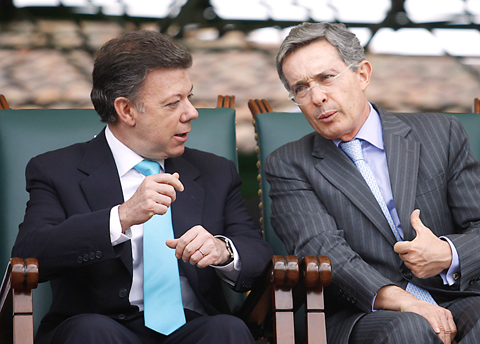For nearly two terms, Colombian President Alvaro Uribe has been the firm hand his country wanted, taking on leftist guerrillas, locking up hundreds of drug traffickers and attracting more foreign investment.
But on one question even he admits he is wavering: Should he stay or should he go?
Uribe left Colombians scratching their heads on whether he plans to run for re-election next year after he said a third term would be inconvenient, but just an hour later acknowledged he was at a crossroads.

PHOTO: RUETERS
“I have a responsibility with Colombians. When I take in the balance of everything, I find myself at what I call a crossroads of the soul, how difficult,” the president said on Thursday night.
Uribe is still riding high on the success of his US-backed war on guerrillas and many Colombians still praise him for making the country safer. But a campaign by allies to change the Constitution and allow the popular conservative to seek re-election is raising fears about Colombia’s democracy.
Washington, which provides military aid to Uribe, reacted cautiously on Thursday, saying Colombians have the right to decide. But the idea of re-election is drawing comparisons to Venezuelan President Hugo Chavez, a fierce US critic who also stayed in office after the constitution was amended.
Uribe’s remarks came just days after the Colombian senate approved a proposed referendum on re-election, edging him closer to a possible run. A special legislative commission and the constitutional court must still approve the proposal before a ballot can be held this year.
With political parties jockeying for position before next year’s election, Uribe may guard his plans to keep his foes off balance and his own alliance united. But a long wait could undermine potential candidates running under his banner.
Another Uribe term could worry the governing Democrats in the US, who are already calling for more conditions on Colombia’s multimillion-dollar aid package and a proposed free trade deal after scandals over human rights abuses by state forces.
“If he commits either way, too early or too late, there are associated costs,” said Patrick Esteruelas at Eurasia Group risk consultancy in New York.
Since the idea of a possible third term was floated, Uribe has kept Colombians guessing about whether he wants another four years in power after two terms leading his hardline campaign against Latin America’s oldest insurgency.
He suggests keeping a president in power is not good and says the country has enough good leaders. But he frets over how his security policies can be maintained and once said he might run in case of a catastrophe, which he did not define.
His ambiguity has even government officials guessing.
“My intuition is that he is going to carry on, yes. But I repeat, I have not one piece of information, and I have not spoken with him,” Colombian Vice President Francisco Santos told a local news program in an interview on Thursday.

Nauru has started selling passports to fund climate action, but is so far struggling to attract new citizens to the low-lying, largely barren island in the Pacific Ocean. Nauru, one of the world’s smallest nations, has a novel plan to fund its fight against climate change by selling so-called “Golden Passports.” Selling for US$105,000 each, Nauru plans to drum up more than US$5 million in the first year of the “climate resilience citizenship” program. Almost six months after the scheme opened in February, Nauru has so far approved just six applications — covering two families and four individuals. Despite the slow start —

YELLOW SHIRTS: Many protesters were associated with pro-royalist groups that had previously supported the ouster of Paetongtarn’s father, Thaksin, in 2006 Protesters rallied on Saturday in the Thai capital to demand the resignation of court-suspended Thai Prime Minister Paetongtarn Shinawatra and in support of the armed forces following a violent border dispute with Cambodia that killed more than three dozen people and displaced more than 260,000. Gathered at Bangkok’s Victory Monument despite soaring temperatures, many sang patriotic songs and listened to speeches denouncing Paetongtarn and her father, former Thai prime minister Thaksin Shinawatra, and voiced their backing of the country’s army, which has always retained substantial power in the Southeast Asian country. Police said there were about 2,000 protesters by mid-afternoon, although

MOGAMI-CLASS FRIGATES: The deal is a ‘big step toward elevating national security cooperation with Australia, which is our special strategic partner,’ a Japanese official said Australia is to upgrade its navy with 11 Mogami-class frigates built by Japan’s Mitsubishi Heavy Industries, Australian Minister for Defence Richard Marles said yesterday. Billed as Japan’s biggest defense export deal since World War II, Australia is to pay US$6 billion over the next 10 years to acquire the fleet of stealth frigates. Australia is in the midst of a major military restructure, bolstering its navy with long-range firepower in an effort to deter China. It is striving to expand its fleet of major warships from 11 to 26 over the next decade. “This is clearly the biggest defense-industry agreement that has ever

DEADLY TASTE TEST: Erin Patterson tried to kill her estranged husband three times, police said in one of the major claims not heard during her initial trial Australia’s recently convicted mushroom murderer also tried to poison her husband with bolognese pasta and chicken korma curry, according to testimony aired yesterday after a suppression order lapsed. Home cook Erin Patterson was found guilty last month of murdering her husband’s parents and elderly aunt in 2023, lacing their beef Wellington lunch with lethal death cap mushrooms. A series of potentially damning allegations about Patterson’s behavior in the lead-up to the meal were withheld from the jury to give the mother-of-two a fair trial. Supreme Court Justice Christopher Beale yesterday rejected an application to keep these allegations secret. Patterson tried to kill her